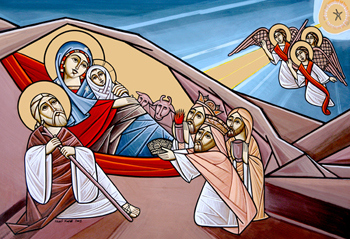VI.iii.2 Abba Vindemius related how Abba Macarius had told the following story:
When I was in Scete two young pilgrims came to me, one of whom had just begun to grow a beard while the other was as yet beardless.
“Where is the cell of Abba Macarius?” they asked.
I said to them, “What do you want to see him for?”
They replied, “We heard about him, and have come to Scete in order to see him.”
“Well, I am he” I said.
They made a deep reverence and said, “We want to stay with you.”
But when I saw how delicate they were, obviously
The elder said, “Well, if we can’t stay here we will go on some where else.”
I thought to myself, “What can I do to them to put them off? Perhaps hard physical labour will drive them away from me.”
So I said to them, “Come then, build yourself a cell if you can.”
They replied, “We will, if you show us how.”
So I gave them some tools and a basket full of bread and salt. I showed them a cliff face and said, “Excavate that, gather rushes from the marsh to make a roof, then go and sit inside.”
I thought that they would be put off by this hard work. But they asked me, “What do we do then?”
And gathering some palm leaves from the marsh I showed them how to begin and what to do next. I said to them, “Make baskets and take them to the church stewards, and they will keep you supplied with bread.”
Then I left them, and they patiently carried out all that I had told them and did not come back to me for the next three years. I persevered in leaving them alone, but kept on wondering to myself what they were up to, and why it was that they had not come back to me to ask about what was going on inside them. Some people came to me from quite a long way off, but these two who were so close came not at all. Nor did they go to anyone else, except to go to church in silence to receive communion. So I fasted for a week and prayed to God that he would show me their manner of working. After that seven day fast I went to them to see what they were doing. When I knocked on the door they opened it and greeted me in silence. I said the prayer and sat down. The elder then made a sign to the younger to go out, while he himself sat down to his weaving, saying nothing. At about the ninth hour he knocked [on a board] and the younger came in with a small dish of pulse. At a sign from the elder he brought out a table, laid on it three small loaves and stood there in silence.
So I said; “Come then, let us eat.”
So we arose and ate, and he brought a vessel from which we drank. When evening came they said to me; “Will you be leaving us?”
But I said, “No, I would like to sleep here tonight.”
So they put out a mat for me on one side and another for themselves in the corner on the other side. They loosened their belts and tunics and lay down to sleep together on their mat opposite me. After they had lain down I prayed to God to show me their manner of working. And the roof of the cell opened up and a light as bright as day burst in, although they were not aware of that light. When they thought that I was asleep the elder nudged the younger in the side, and they got up, girded themselves and stretched out their hands to heaven. I could see them, though they could not see me. And I saw demons like flies buzzing round the younger brother. Some came and settled on his mouth, others on his eyes. And I saw an angel of the Lord with a fiery sword flying around them, striking at those demons. But they were not able to come near the elder. Towards morning they went back to bed. I pretended to wake up and they did likewise.
The elder said nothing except “Shall we say the twelve psalms?”
And I said, “Yes, indeed.”
The younger sang five psalms and with every word a tongue of fire came out of his mouth and flew up to heaven. Likewise when the elder opened his mouth to sing the psalms a fiery cloud came out of his mouth and reached up to heaven. I too added a little opus dei from my heart, in tune with them.
As I left I said, “Pray for me”, and they wordlessly signified that they would. And from all this I understood that the elder had become perfected, while the younger was still battling, even though safe from harm. A few days later the elder died, and the younger followed three days later. And whenever any of the fathers came to visit Macarius after that he would take them to those brothers’ cell, saying, “Come and see the martyrdom of those two young pilgrims.”
De Vitis Patrum, Book VI, Libellus 3: The Superlative Observances of Some Holy People.

